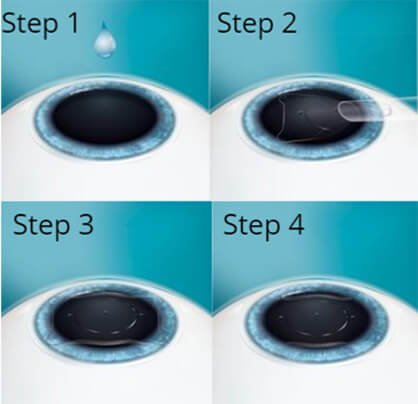When considering Implantable Collamer Lens (ICL) surgery abroad, Korea often tops the list thanks to its cutting-edge technology, affordable pricing, and exceptional surgical outcomes. However, the most critical decision you’ll make isn’t the clinic — it’s the ophthalmologist performing your surgery.
Choosing a certified and highly experienced ICL surgeon in Korea is essential for achieving safe, long-lasting results. In this guide, we’ll break down everything you need to look for in a Korean ophthalmologist so you can confidently schedule your vision correction journey.
👨⚕️ Why the Right Ophthalmologist Matters for ICL Surgery
ICL surgery may seem simple, but it requires:
- Precise pre-operative measurements (to custom-fit the lens)
- Meticulous surgical skill during lens implantation
- A deep understanding of eye anatomy and potential complications
A qualified, board-certified ophthalmologist ensures:
- Better outcomes with fewer complications
- Faster recovery and higher patient satisfaction
- Confidence throughout your medical travel journey
✅ 1. Look for Korean Board Certification in Ophthalmology
In Korea, the gold standard is certification by the Korean Ophthalmological Society (KOS) or the Korean Medical Association (KMA). These credentials indicate:
- Completion of medical school and residency in ophthalmology
- Rigorous exams and clinical training
- Continuous education requirements
📝 Ask to see:
- KOS/KMA certification
- Fellowship or subspecialty training in refractive surgery
Bonus tip: Many top ICL surgeons in Korea have also trained or published internationally.
✅ 2. Prioritize Surgeons with ICL-Specific Experience
Not all eye surgeons regularly perform ICL procedures. Choose a doctor who:
- Has performed hundreds or thousands of ICL cases
- Specializes in refractive surgery or implantable lenses
- Is listed as an official EVO Visian ICL™ provider by STAAR Surgical (the lens manufacturer)
📝 Ask directly:
“How many ICL procedures have you performed in the past year?”
“Do you use EVO or EVO+ Visian ICL lenses?”
✅ 3. Choose a Clinic That Focuses on Refractive Surgery
Some general eye hospitals perform ICL among other services. But for optimal results, choose a vision correction specialty clinic — especially those with:
- Dedicated refractive surgery departments
- In-house diagnostic labs (Pentacam, iTrace, OPD scan)
- Multiple ophthalmologists for team-based care and second opinions
Look for clinics in Seoul’s “Eye Clinic District” in Gangnam, known for housing some of Korea’s best-known eye surgery centers.
✅ 4. Read Verified Patient Reviews (Especially from Foreigners)
Authentic testimonials give you insight into:
- Surgical results
- Bedside manner and communication
- Experience for international patients
- Post-op support and transparency
Check:
- Google Reviews
- YouTube testimonials (search: “ICL Korea + [Your Country]”)
- Instagram stories from past patients
- Reddit threads in r/medicaltourism or r/korea
📝 Look for keywords like: “ICL Seoul review,” “foreigner ICL experience,” “EVO ICL Korea results.”
✅ 5. Confirm English (or Your Language) Support
Even the best surgeon can be difficult to work with if there’s a language barrier. A certified ICL clinic in Korea should provide:
- English-speaking coordinators or interpreters
- Translated consent forms and post-op instructions
- Direct communication with the doctor in your language or with a translator present
📝 Ask:
“Will I have an English-speaking coordinator before, during, and after surgery?”
✅ 6. Review Technology and Equipment
A skilled ophthalmologist needs the right tools. Make sure the clinic uses:
- Pentacam: For corneal thickness and anterior chamber analysis
- iTrace or OPD Scan: For wavefront and pupil mapping
- FDA-approved EVO Visian ICL™ lenses
- Cleanroom or laser suite with ISO certification
Korean clinics often outpace Western hospitals in terms of equipment modernization and offer digital eye mapping that improves ICL accuracy.
✅ 7. Assess Transparency and Ethics
A trustworthy ophthalmologist won’t:
- Push you to book the same day
- Promise “perfect” vision without discussing risks
- Hide costs or suggest unnecessary add-ons
They will:
- Discuss both benefits and potential complications (e.g., halos, night glare)
- Walk you through lens sizing, surgery day expectations, and follow-up plans
- Allow you time to think before committing
📝 Red flag: Clinics that guarantee 20/20 vision or heavily upsell cosmetic add-ons unrelated to eye health.
🌐 Bonus: How to Start the Process as an International Patient
Most certified ophthalmologists in Korea now offer:
- Free online vision assessments
- Virtual video consultations
- Pre-arrival support for scheduling and travel
📝 Tip: Look for clinics with dedicated “Medical Tourism Coordinators” listed on their website.
📍 Where to Find Certified ICL Surgeons in Korea
Top Cities:
- Seoul (Gangnam, Apgujeong) — highest concentration of premium ICL clinics
- Busan — rising popularity among medical tourists for vision and cosmetic surgery
- Daegu — known for competitive pricing and high-quality facilities
Suggested Clinics to Research:
(Note: Always verify credentials and reviews independently)
- BGN Eye Clinic (Seoul & Busan)
- EYEREUM Eye Clinic (Gangnam)
- EYEVELY Eye Center
- Dream Eye Center
- S&B Eye Clinic
✅ Final Checklist: Choosing the Right ICL Ophthalmologist in Korea
| Criteria | What to Look For |
|---|---|
| 🩺 Certification | KOS/KMA board-certified ophthalmologist |
| 👁️ ICL Experience | 500+ ICL procedures; EVO Visian certified |
| 🏥 Facility | Refractive-focused, with modern diagnostics |
| 🌐 Language Support | English/Chinese/Russian coordination |
| 💬 Reviews | Verified testimonials from foreign patients |
| 💡 Ethics | Transparent consultation and realistic promises |
👓 Final Thoughts
ICL surgery can be life-changing — but only when done by the right hands. In Korea, you’ll find world-class ophthalmologists who combine precision, technology, and care tailored for international patients. With proper research and the right questions, you’ll not only improve your vision — you’ll gain peace of mind.




